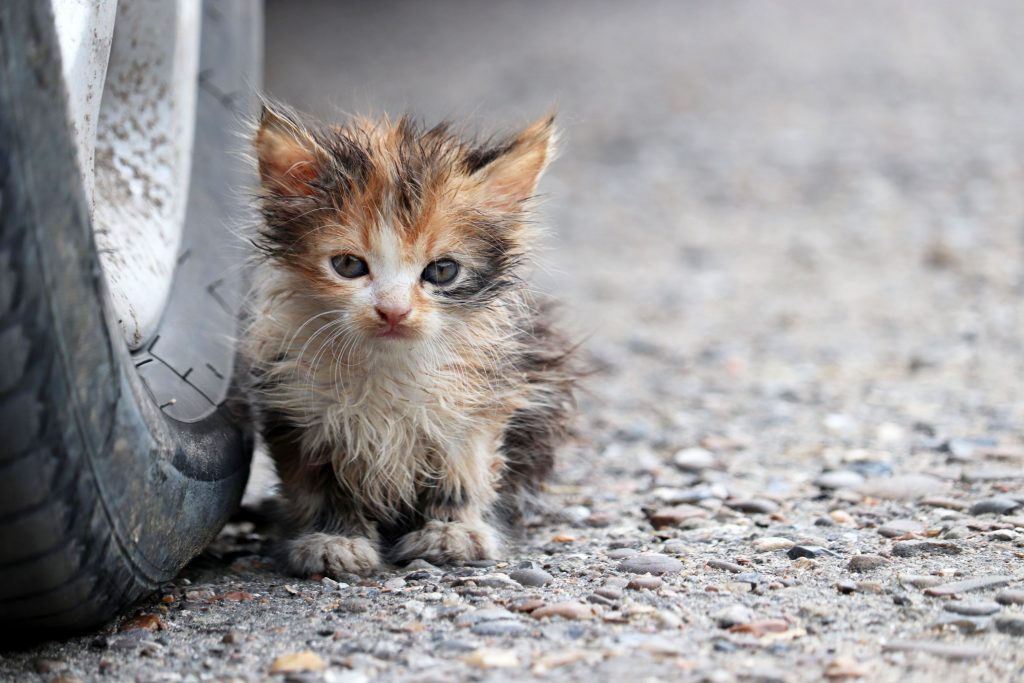Posts in Category: Pet Safety
Have You Heard Of Hyperthyroidism in Cats?
Cat owners are typically looped into the common potential health issues facing modern felines. In addition to heartworm disease, diabetes, feline leukemia virus (FelV), and feline immunodeficiency virus (FIV), hyperthyroidism in cats is increasingly prevalent. Characterized by weight loss, increased appetite/thirst, and vomiting or diarrhea, this condition must be promptly addressed. The good news is that once hyperthyroidism in cats is properly managed, a high quality of life is attainable.
Anatomy Details
Located within the neck, the thyroid gland produces a hormone that regulates metabolism. When too much hormone is produced, metabolism increases which explains why cats lose weight despite a voracious appetite. While this symptom is a red flag, many owners don’t automatically realize that it’s tied to something serious.
Cats between the ages of 10-13 are commonly diagnosed with hyperthyroidism. Blood tests and other diagnostics can help diagnose hyperthyroidism in cats, and rule out a series of other common conditions like kidney disease, diabetes, and cancer (all share similar clinical symptoms). We may also need to perform an electrocardiogram, chest x-ray, ultrasound, and blood pressure to gain a better understanding of a cat’s condition.
Since a vast majority of cases are linked to a benign tumor on one or both lobes of the thyroid gland, it is critical to move quickly toward effective treatment. Prognosis is usually very good if caught early.
Next Steps
Depending on the severity, hyperthyroidism in cats may be properly managed with medical treatment, close monitoring, and prescription diet. Medication taken twice a day for life can decrease the production of thyroid hormone.
Injections of radioactive iodine can also decrease thyroid hormone levels in a shorter amount of time, but require a hospital stay. This is often the fastest and safest method to lower thyroid hormone levels.
Surgical removal of the thyroid gland may be necessary in extreme cases. However, the elimination of the thyroid gland may result in serious health complications.
Every Step of the Way
Your team at Volunteer Veterinary Hospital understands that hyperthyroidism in cats can be very challenging to face. Due to its effect on feline blood pressure, heart health, eye health, neurologic functions, and the kidneys, this condition must be closely observed. If we’re able to catch the disease early on, hyperthyroidism in cats can be effectively treated.
Hyperthyroidism in Cats
Your cat’s annual wellness exam creates the opportunity to catch health problems before they get out of hand. Early detection can lead to a better prognosis, affecting your cat’s overall health and lifespan.
Remember, if you see any changes to your cat’s eating/drinking behavior, vomiting and/or diarrhea, poor coat quality, and weight loss, please don’t hesitate to call us at (865) 609‑0311.
Summer In Scruffy City: Pet Friendly Knoxville
We’re number one in southern hospitality–a fact not lost on the pets we know and love. In fact, we probably go a little over the top when our four-legged friends are concerned. Pet friendly Knoxville is the place to beat when it comes to activities to share together, and we’ve got the low-down on how and where to start and end any summer day in town.
Continue…Top 5 Places to Go with Your Pet in Knoxville
At Volunteer Veterinary Hospital, we love our hometown for so very many reasons. One of our favorites, though, is all of the pet-friendly spots in and around the city. If you are looking for something to do with your pet in Knoxville, here are some of our top suggestions:
Barley’s Taproom & Pizzeria
One of Knoxville’s favorite spots for pizza and beers, Barley’s Taproom & Pizzeria has a dog-friendly patio. Bring Fido on your next dining excursion to enjoy the tasty menu selections and hard-to-beat atmosphere. The taproom is open until 10 PM on weeknights and until midnight on weekends.
Continue…Taking Care of a Blind Dog
Animals are truly amazing at adapting to vision changes. Dogs can learn to interpret their surroundings despite impairment simply because the eyes are not their primary sensory organ. That doesn’t mean that a blind or visually impaired dog doesn’t need a little help from their human companion, though. In fact, taking care of a blind dog comes with its own specific set of safety and comfort requirements. We can assure you that each and every one of them is well worth the time and effort.
Continue…The Proper Place: When to Pay Attention to Your Dog’s Penis
You know your male dog has one, but it’s easier or more comfortable to ignore it. That is, until your dog’s penis appears to be…stuck. Many dogs will go through their lives without needing any attention to their nether parts. But it’s just as common for dogs to get into a predicament known as paraphimosis, and it can become a real pet emergency.
Continue…What Foods are Safe (and Unsafe) for My Pet During the Holidays?
The holidays are just around the corner! If you’re anything like us, one of the things you’re looking forward to the most are all those festive holiday treats. Your dog(s) would love for you to know that holiday treats aren’t just for humans.
Of course, when it comes to festive treats, keeping your dog healthy and safe is our top consideration. Nobody wants to be making a surprise trip to the vet because your dog swallowed a rawhide splinter.
Continue…Pancreatitis in Pets: Signs and Symptoms
Thanksgiving day is almost here. We loosen our belts and prepare to feast with all our favorite dishes on the table. While catching up with family and friends, it can be easy to forget your pets are nearby hoping for some scraps. There are a lot of Thanksgiving foods that can mean health problems for your pets, however.
Continue…Your Green Thumbs Doesn’t Mean No Paws: Tips for Pet-Safe Gardening
The love of plants and the love of animals often go hand-in-hand. Many plants, however, are toxic to pets and the avid gardener must always have this in the back of their mind. Volunteer Veterinary Hospital knows, though, that plants and pets can coexist harmoniously. Read on to learn how to be sure that your gardening is pet-safe gardening.
Continue…Traveling with Your Pet Safely
A change in seasons means new possibilities for traveling and vacationing with your family. Whether your travels are by air or by car, you want to keep safety as your top priority. This is especially important if you are traveling with your pets! The team at Volunteer Veterinary Hospital has put together the essential safety tips for traveling with your pets:
Continue…Microchipping Your Pet Could Be the Best Decision You’ll Ever Make

Pet owners have an abundance of leashes and collars to choose from. They can be versatile, stylish, or robust, but the one thing a sturdy leash-collar combination cannot do is help locate a lost or missing pet.
Microchipping your pet is a quick, safe option that can guard against accidental separation if their collar falls off or is removed. They are part of an amazing technology, but how exactly do microchips work?
The Fine Print
Pets don’t necessarily plan on becoming lost or separated from their owners, but it happens with regular frequency.
Cases of missing pets spike around certain holidays, like Independence Day (think fireworks) or Halloween (think scary costumes), but they can also result from thunderstorms, parties, or the simple act of wandering a little too far.
Continue…









